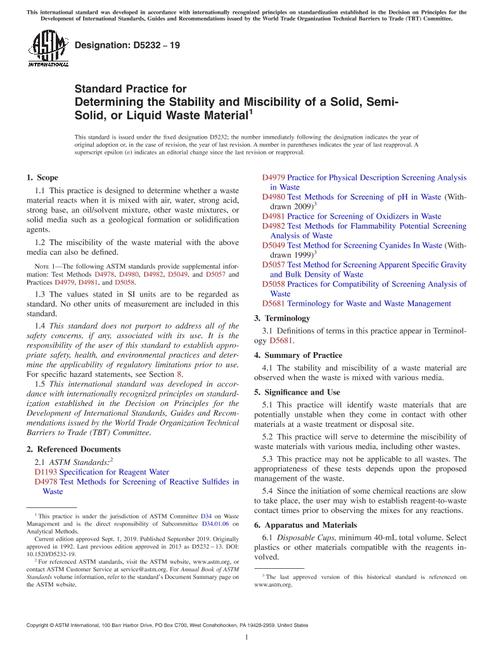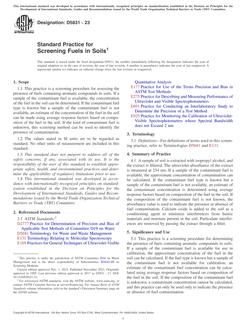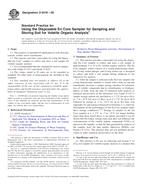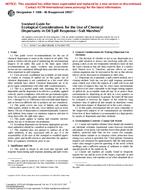-
-
Available Formats
- Availability
- Priced From ( in USD )
-
Available Formats
-
- Immediate download
- $58.00
- Add to Cart
-
- Printed Edition
- Ships in 1-2 business days
- $58.00
- Add to Cart
Customers Who Bought This Also Bought
-

ASTM D5232-19
Priced From $42.00 -

ASTM D5831-23
Priced From $63.00 -

ASTM D6418-09
Priced From $67.00 -

ASTM F1008-86(1993)e1
Priced From $50.00
About This Item
Full Description
1.1 This practice provides equations and nomographs, and a reference to a computer program, for calculating probabilities of detecting hot spots (that is, localized areas of soil or groundwater contamination) and buried objects using point-net (that is, grid) search patterns. Hot spots, more generally referred to as targets, are presumed to be invisible on the ground surface. Buried objects may include former surface impoundments, waste disposal pits, and utilities that have been covered by soil or paving materials. Hot spots may also include contaminant plumes in ground water or soil gas.
1.2 For purposes of calculating detection probabilities, hot spots or buried objects are presumed to be elliptically shaped when projected vertically to the ground surface, and search patterns are square, rectangular, or rhombic. Assumptions about the size and shape of suspected hot spots are the primary limitations of this practice, and must be judged by historical information. A further limitation is that hot spot boundaries are assumed to be clear and distinct. Alternative approaches to hot spot detection using discrete sampling should also be considered where feasible, such as surface geophysical measurements (see Guide D 6429).
1.3 Search sampling would normally be conducted during preliminary investigations of hazardous waste sites or hazardous waste management facilities (see Guide D 5730). Sampling may be conducted via drilling or by direct-push methods. In contrast, guidance on sampling for the purpose of making statistical inferences about population characteristics (for example, contaminant concentrations) can be found in Guide D 6311.
1.4 This standard does not purport to address all of the safety concerns, if any, associated with its use. It is the responsibility of the user of this standard to establish appropriate safety and health practices and determine the applicability of regulatory limitations prior to use.
Document History
-
ASTM D6982-22
Standard Practice for Detecting Hot Spots Using Point-Net (Grid) Search Patterns- Most Recent
-
ASTM D6982-09(2016)
Standard Practice for Detecting Hot Spots Using Point-Net (Grid) Search Patterns- Historical Version
-
ASTM D6982-09
Standard Practice for Detecting Hot Spots Using Point-Net (Grid) Search Patterns- Historical Version
-
ASTM D6982-03
currently
viewing
Standard Practice for Detecting Hot Spots and Buried Objects Using Point-Net (Grid) Search Patterns- Historical Version





